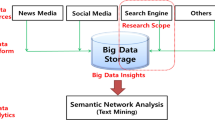Abstract
The paper presents results of semantic search analysis of the key educational concepts and their conceptual relations presented in the course “Supercomputers I and II” taught at the School of Media, Arts and Technology at the Solent Southampton University during the 2015–2019 academic years. The study uses Big Data Analytics approaches to extract the domain key concepts and to outline their pedagogical interconnections which reflect the structure of course lectures, so to teach ‘supercomputers’ as an university subject with its specificity and to allow students to acquire that knowledge comprehensively by having the insight of its key concepts as well as of its practical applications. The study uses the Sketch Engine software’s statistical approaches, so to extract the key terms (related to the key concepts in the field) from the course texts lectures and to compare their semantic content with that produced by the students (feedback) in the related courses taught at some other universities in UK. It, also, outlines the importance of the ‘activity-based learning approach’ used for supporting the teaching process, so to improve the acquired knowledge by the use of Solent Online Learning system allowing interactive and distant web-based learning.
Access this chapter
Tax calculation will be finalised at checkout
Purchases are for personal use only
Similar content being viewed by others
References
Baroni, M., Evert, S.: Statistical methods for corpus exploitation. In: L\(\ddot{u}\)deling, K., Kyt\(\ddot{o}\), M. (eds.) Corpus Linguistics: An International Handbook, vol. 2, pp. 777–803. Mouton De Gruyter, Berlin/New York (2008)
Baroni, M., Lenci, A.: Distributional memory: a general framework for corpus-based semantics. Comput. Linguist. 36(4), 673–721 (2010)
Blue, G.: Developing Academic Literacy. Peter Lang (2010)
Gledhill, Ch.: Collocations in Science Writing. Gunter Narr Verlag (2000)
Killgarriff, A., et al.: The sketch engine: ten years on. Lexicography 1, 17–36 (2014)
Nation, P., Heatley, A.: Range: A Program for the Analysis of Vocabulary in Texts (2002). http://vuw.ac.nz/lals/staff/paul-nation/nation.aspx
Penev, K., Rees, J.: Development of a ‘sticky’ virtual community on the Internet environment. In: 9th European Conference on Knowledge Management, pp. 645–652. Academic Publishing Limited, UK (2008)
Stoykova, V.: Extracting academic subjects semantic relations using collocations. EAI Endorsed Trans. Energy Web Inf. Technol. 4, 17(14) (2017a). https://doi.org/10.4108/eai.4-10-2017.153161
Stoykova, V.: Discovering distributional Thesauri semantic relations. In: 2017 Proceedings of the 3rd International Workshop on Knowledge Discovery on the Web, CEUR-WS, Cagliari, Italy (2017b). http://ceur-ws.org/Vol-1959/paper-11.pdf
Thompson, P.: Changing the bases for academic word lists. In: Thompson, P., Diani, G. (eds.) English for Academic Purposes: Approaches and Implications, pp. 317–342. Cambridge Scholars, Newcastle-upon-Tyne (2015)
Acknowledgments
The authors are supported by Ministry of Education and Science – Bulgaria, Grant No BG05M2OP001-1.001-0003, financed by the Science and Education for Smart Growth Operational Program and co-financed by the European Union through the European structural and Investment funds and by the National Scientific Fund of Bulgaria under grant DFNI DN12/5 “Efficient Stochastic Methods and Algorithms for Large-Scale Problems”.
Author information
Authors and Affiliations
Corresponding author
Editor information
Editors and Affiliations
Rights and permissions
Copyright information
© 2021 The Editor(s) (if applicable) and The Author(s), under exclusive license to Springer Nature Switzerland AG
About this paper
Cite this paper
Fidanova, S., Stoykova, V. (2021). Teaching Supercomputers. In: Dimov, I., Fidanova, S. (eds) Advances in High Performance Computing. HPC 2019. Studies in Computational Intelligence, vol 902. Springer, Cham. https://doi.org/10.1007/978-3-030-55347-0_10
Download citation
DOI: https://doi.org/10.1007/978-3-030-55347-0_10
Published:
Publisher Name: Springer, Cham
Print ISBN: 978-3-030-55346-3
Online ISBN: 978-3-030-55347-0
eBook Packages: Intelligent Technologies and RoboticsIntelligent Technologies and Robotics (R0)




